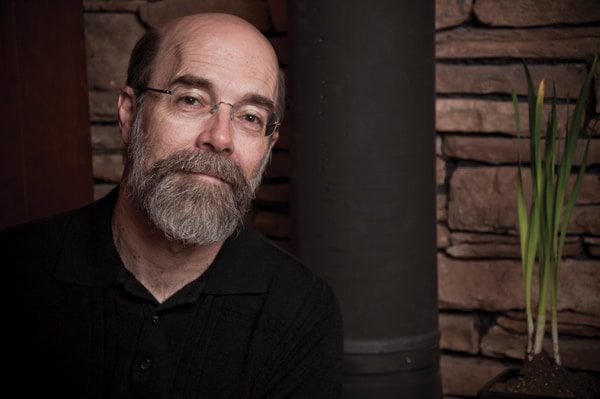The Word Made Flesh: Michael Card Interview

Michael Card’s amazing body of work, largely focusing on biblical themes, his insatiable hunger for the Word and lifelong learner status as well as a passion for knowing and making known Jesus Christ through myriad media make him the ideal person for a conversation about the Word made Flesh.
This is an expanded interview from one previously published in WL Magazine.
Worship Leader: You are in the midst of writing a series focusing individually on each of the four gospels. How do you approach such a weighty undertaking, and how—or if— it has formed you and transformed your worship?
Card: Well, the approach or the process is something that I was taught by the man who discipled me over 27 years. And it has made a huge impact on me on the way I understand the Word… which is inevitably going to impact my worship. I define worship pretty broadly. So it’s not the 30 minutes on Sunday. You engage at the level of your imagination which is where I believe your heart and your mind intersect. We call it the “biblical imagination.” And the idea is that because of the fall we’re fragmented. Some of us read the Bible with our mind, and we’re very systematic and theological. And those people tend to like to argue. Some of us read it with our heart, and that tends to be more of an emotional response. And, the thing is the Bible is speaking to the whole person. So, the approach is just to try to engage with, with all your heart and your mind… When you consider that the Bible is mostly aimed at recapturing your imagination—it’s not a didactic book that teaches in outlines and systems and that kind of thing. It’s a book that speaks to your imagination with parables and songs and images. So, it really does make sense.
WL: How has your relationship with Jesus the Word made flesh and also the Word in Scripture changed over time?
Card: I think there was a time before I was in the thick of things: the thick of family. The thick of being on the road, of writing a book a year and an album a year, there was a time when I frankly had more meditative time. I honestly think there was a time when I spent more time with Jesus in that way. And in a lot of ways I’ve been drawing on that time ever since. From age 14 to 25 I read a book of the Bible a day. But, I haven’t done it in years. Yet, in terms of pure engagement with Scripture, I’m learning more now than I’ve ever learned. And that’s not necessarily always the same thing as getting closer to Jesus. Because a lot of people know a lot about the Bible don’t seem to have ever encountered him. And, so, that’s always going to be a struggle with me.
WL: Do you see any aspects of the word that is either left out of worship or over-emphasized?
Card: The big thing for me was Lament. When I discovered that sometimes the most precious thing we have to offer in worship is the thing that hurts us the most. And then, when I did the research and saw that numerically there are more psalms of lament than any other kind of psalm. It became this huge self-evident piece of the Bible that is underrepresented in all of Christian music. You go back to the hymnal: “A Sacred Head Now Wounded” is about it. There, are very few laments. …But, I always ask people, “When at the point in his life when he’s most being used by God, what is Jesus doing?” He’s lamenting. To realize that Lament is worship and it invariably leads to praise, that was huge for me. If I can offer up my confusion and my anger, gee, I may be the best worshiper he’s got. “The sacrifices of God are a broken spirit, a broken and contrite heart” (Ps 51:17). That’s me right there.
WL: You’ve got four gospels circulating in your head at once. What are you finding in terms of the way that each of these authors treats the gospel story?
Card: Well, for me what’s resonating is the personal individual portrait of Jesus. Each one of the gospel writers are all different people in the first place. They have come from different backgrounds. Luke had been Paul’s disciple and Mark had been Peter’s disciple. So you’ve got to take into account the influence that Peter and Paul had on the gospels of Luke and Mark. What’s getting me and what keeps drawing me in is this portrait, this intimate portrait of Jesus that is nuanced and slightly different in each one. And, that’s a place where I’m getting to know Jesus better. Which is why we read the Bible anyway, right?
WL: You just finished writing the book on Mark. Where did that take you?
Card: Jesus is the most emotional in the gospel of Mark which if Mark is derived from Peter; it makes a lot of sense. Because Peter received more emotional energy from Jesus than anybody. And, I’ve always worried that, because I have a good imagination—and your greatest strength is always your greatest weakness—I’ve always worried that Jesus is a figment of my imagination. And he’s just this person I’ve created out of bits and pieces. And Mark is the person who wants to make sure that he’s not. And that’s the reason right now, I’m so thankful to Mark.
WL: Any other big revelations on this journey through the Gospels?
CARD: One of the biggest things I’ve seen from the gospels in the last five years is how completely Jesus doesn’t categorize anybody. The door of his life is open to everybody to the point that it really makes people mad. Sure we know he drinks with sinners and that sort of thing. But, he has a disturbing openness to everybody. And I think if we want to get closer to Jesus in our time that those distinctions have to go away. Paul tells us, “Neither Jew nor Greek…male nor female” (Gal 3:28) Goodness, the gospel overshadows all those! And you see it in Jesus’ life. Nobody, even the Pharisees, get dealt with as categories. He’ll condemn the Pharisees. But, when he’s engaging, he’s engaging with one person at a time. And he tends to know their names; he knows their backgrounds, who they are. And, that’s one of the big things I’ve learned. It’s so easy to sin against categories of people. Just think, the most fundamental category that separates us is male and female. Paul will say “That’s gone. Those days are over.” That’s, especially for men, a big challenge. But, in terms of having intently looked at the gospels for a long time that’s one of the really earth shaking things for me.
WL: Any final thoughts about the Word in text and the Word made flesh?
CARD: I think what people need to understand is the way the word gets used is very broad and has lots of nuances. In the Old Testament, the Hebrew word is debar, “what you say is what you do.” There’s this connection so when God speaks the world into existence that’s very, very Hebrew. And the word in the Old Testament, especially in the, in the prophets is very often a person. The word comes to people the way a person comes. And it appears to me anyway, very Christological. In the gospel of John, 1 John and Revelation is Jesus, the capital “W” word. Then for the rest of the New Testament, the word of God tends to be, the gospel. The sower sows seeds of the word. And then, in Hebrews, it says the word of God is like a sword, meaning, I believe, the Bible in general, but I think the meanings and the nuances of all those really become clear in Jesus. I think that’s why John calls him “the” Word. So this idea that what God speaks happens: John, says, “Oh well that’s Jesus.” God spoke the incarnation. He spoke the living Word and it happens.” And, this confusion that the “Word is the Bible” is somehow “the Bible is Jesus.” Certainly that’s more magical thinking than anything else. But, I’ll say that I wouldn’t know Jesus if it wasn’t for the Bible. As Scotty Smith puts so eloquently, “God has spoken and not stuttered.”





